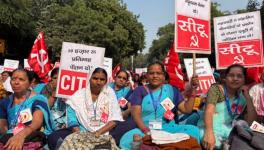Women's Menstrual Health: Social, Economic and Cultural Aspects
In this Delhi slum, reluctance to using sanitary pads instead of rags puts women's lives at risk.
Across the busy market of Rani Bagh in northwest Delhi is Shakur Basti railway station. If you take the narrow, blue foot-over bridge to get to the other side of the station, you would find yourself at the entrance to Shakur/Shakurpur Basti slum area. The Basti has over 2000 quarters divided into A, B and C blocks. A view from the top of the Basti might make it look as if it is nestled between narrow alleys of dried up drainage.

The Basti's population consists mostly of migrants – men who work as rickshawpullers, labourers or factory workers, and women who are either housewives, or work as domestic maids in the near-by fast-growing middle class societies of Pitampura, Rani Bagh and Lok Vihar. Even as their meagre income fetches them education for their children, a satellite TV connection for entertainment, and a cooler by the window to cool themselves in the humid weather, women's health and hygiene in this Basti, like in several others, have been completely neglected.
Of all issues concerning women's health, menstruation is a subject that is treated as a taboo. Women avoid speaking about it. Men feel discomfort at the mention of it. 'Menstruation' is hushed up, and if at all spoken about, it is murmured by the mother to the daughter who has attained puberty.
Most women in this Basti use old cloth during menstruation; very few buy sanitary pads. Seema, who is an Accredited Social Health Activist (ASHA) in the area, reported that the women are casual about their health and menstrual hygiene. “A pack of eight pads is available at the GRC (Gender Resource Centre) for Rs 10. But very few women buy these packs. I have tried convincing them, but they use what they have been always using,” she said.
The scheme on 'Menstrual Hygiene Management' for women and adolescent girls was launched in 2010 to ensure subsidized sanitary napkins for their health needs. Under the scheme, a pack of eight sanitary pads are sold for Rs. 10 through the GRC or the Stree Shakti Suvidha Kendra to promote women's health. However, due to lack of information regarding this scheme and due to unaffordability of branded sanitary pads, women tend to use the age-old methods of handling menstruation – using cloth or paper as absorbent.
The used cloths are disposed in the open field where the entire Basti defecates. “So many women throw away the used cloth or pad in the 'jungle' (open field) without wrapping them in a paper. It is embarrassing because even young boys who know nothing about it (periods) could easily get to know,” said Prabha, a woman in her thirties.
In 2011, the Delhi Government also launched the 'Kishori Scheme' to tackle the large number of dropouts among school girls who have attained puberty. As a part of this scheme, girls from class 6 to 12 in government and government-aided schools are given a pack of 10 sanitary napkins at the end of every month.
Some women said that their daughters miss school for a day or two during their periods because of pain in the abdomen. Women complain of white discharge, but since no health camp is set up in the Basti, ASHA and Anganwadi workers are the only people to approach for any health issue.
“Using cloth or other unsanitary material causes Reproductive Tract Infection and Vaginitis. Many women complain of white discharge throughout the month which is due to yeast infection. ” said Dr. Rajani Manchanda, specialist in Pediatrics and Family Planning. “Using unsaniatary materials is a major cause of cervical cancer in these women,” said Dr. Manchanda who works with women in the slums of Jahangirpuri and Shadipur. Women in these slums do not buy low-cost sanitary pads for themselves even if they buy them for their daughters. “It is difficult to change habits. Even the water that they use to wash their genitals is not clean,” she said.
Menstruation is seen as a private issue, so any public discussion or information on the subject is difficult to get across to the women without initial hesitation or reluctance on their part. Therefore, just making low-cost sanitary pads available for women is not sufficent. There is a need to campaign for importance of using sanitary pads, and to inform the women on how their health is at risk when they choose cloth and other materials over sanitary pads. Without such a campaign, inspite of availability of low-cost sanitary napkins, the older practices will continue putting women at risk.
Disclaimer: The views expressed here are the author's personal views, and do not necessarily represent the views of Newsclick
Get the latest reports & analysis with people's perspective on Protests, movements & deep analytical videos, discussions of the current affairs in your Telegram app. Subscribe to NewsClick's Telegram channel & get Real-Time updates on stories, as they get published on our website.
























